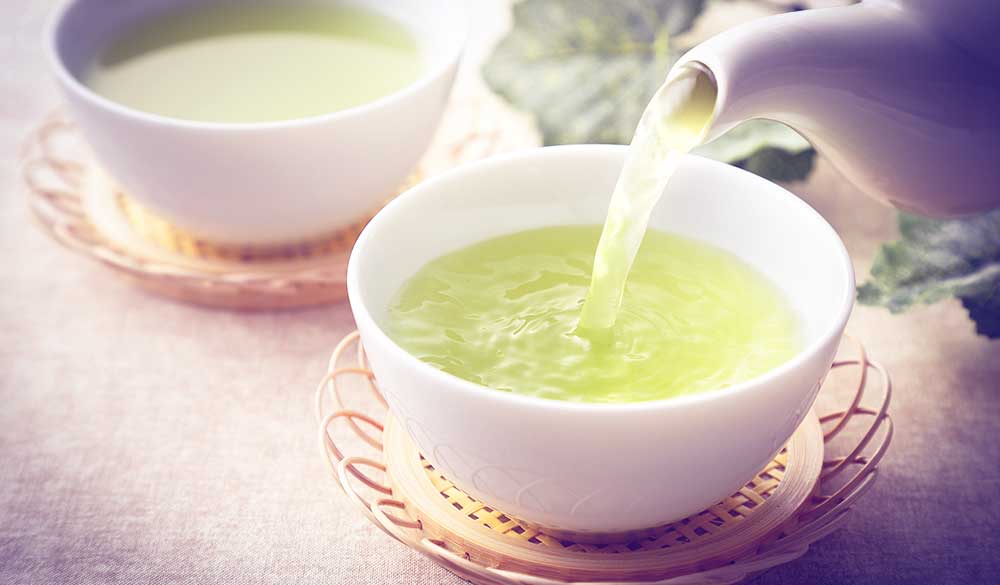L-theanine, also known as gamma- glutamylethylamide, is a unique non-protein amino acid first isolated by Japanese researchers in 1949.[1] It is found almost exclusively in varieties of the tea-producing plant Camellia sinensis.
L-theanine is synthesised from glutamic acid and ethylamine in the roots of the tea plant and subsequently concentrated in the leaves, where it contributes significantly to the taste of green tea.[2] L-theanine is the major amino acid found in green tea where it makes up 1-3% of the weight of the dry tea leaf.[3]
L-theanine increases alpha brain wave activity and modulates neurotransmitter activity, and is thus used for anxiety, relaxation, cognitive enhancement and to improve sleep. L-theanine has also been used for hypertension and to enhance the effects of chemotherapy drugs.[3]
Key benefits
- Antihypertensive
- Anxiolytic
- Enhances alert relaxation
- Enhances cognition
- Increases alpha brain wave activity
- Neuroprotective
- Relaxant
Clinical applications
- Attention deficit hyperactivity disorder (ADHD)
- Alzheimer’s disease
- Anxiety
- Hypertension
- Schizophrenia
- Sleep disorders
- Stress
- To enhance cognitive performance
- To enhance the effects of chemotherapy
Mechanisms of action
Stress and anxiety
L-theanine’s most documented effects include its ability to reduce anxiety, induce relaxation and decrease both physical and mental stress. L-theanine crosses the blood-brain barrier, producing its desired effects within 30 minutes; a quality that is highly beneficial for the treatment of acute stress and anxiety.[4]
Research shows that L-theanine increases alpha brain wave activity, resulting in a relaxed but alert mental state.[4] L-theanine has also been shown to bind to glutamate receptors, blocking the binding of L-glutamic acid to glutamate receptors in cortical neurons, possibly inhibiting excitation.[5] L-theanine may also up-regulate inhibitory neurotransmitters, including gamma-aminobutyric acid (GABA), and modulate serotonin and dopamine concentrations in selected areas of the brain.[6,7]
Clinical trials confirm that L-theanine reduces anxiety, attenuates the stress response, reduces stress induced changes in blood pressure and increases relaxation at dosages of 50-200mg a day.[5,8]
Sleep
Clinical studies utilising L-theanine as a sleep aid have found it to be safe, effective, non-addictive and without other side effects commonly associated with prescription sleep medications.[9]
Rather than producing a sedative effect, L-theanine provides its sleep enhancing benefits through anxiolysis. As it does not cause daytime drowsiness, L-theanine may be used for relaxation and induction of sleep at any time of the day.[9,10]
Clinical studies involving healthy adults and children with ADHD have shown that L-theanine significantly improves sleep efficiency, produces less wakefulness after sleep onset, reduces fatigue upon rising and provides feelings of prolonged and restful sleep.[10,11]
Cancer
L-theanine may have an important role as an adjuvant to cancer treatment with animal and in vitro research revealing that it decreases tumour size, reduces metastases, reduces bone marrow suppression, and increases the efficacy of chemotherapeutic agents.[2,12] It exerts these benefits by competitively inhibiting glutamate transport into tumour cells thereby decreasing intracellular glutathione levels, and inhibiting the efflux of chemotherapeutic agents, resulting in their accumulation in tumour cells. By maintaining cellular glutathione levels, L-theanine also provides antioxidant protection to normal cells.[2,13]
Evidence-based Dosage ranges
| Condition | Dosage | Reference |
| Anxiety | 200mg/day | 8 |
| Cancer – as an adjuvant to chemotherapy | 400-800mg three times daily | 2 |
| Cognitive performance | 100-250mg (plus 50-150mg caffeine)/day | 14,15 |
| Relaxation | 50-200mg/day | 4, 16 |
| Schizophrenia – to reduce anxiety and general psychopathology symptoms | 400mg/day (as an adjuvant to prescribed antipsychotic medication) | 17 |
| Sleep | 200mg once to twice a day | 10, 11 |
| Stress | 200mg/day | 5 |
Cautions and contraindications
- Safety in pregnancy and lactation has not been established.[3]
- Theoretically, concomitant use of L-theanine with antihypertensive medications may produce an additive effect.[3]
- Theoretically, concomitant use of L-theanine with stimulants might decrease their effect.[3]
- Animal and in vitro research shows that L-theanine enhances the efficacy of chemotherapy drugs.[3]
References
- Vuong QV, Bowyer MC, Roach PD. L-theanine: properties, synthesis and isolation from tea. J Sci Food Agric 2011;91(11):1931-1939. [Abstract]
- L-theanine monograph. Altern Med Rev 2005;10(2):136-138. [Full Text]
- Theanine. Natural Medicine Comprehensive Database 2015. [Source]
- Nobre AC, Rao A, Owen GN. L-theanine, a natural constituent in tea, and its effect on mental state. Asia Pac J Clin Nutr 2008;17 Suppl 1:167-168. [Full Text]
- Kimura K, Ozeki M, Juneja LR, et al. L-theanine reduces psychological and physiological stress responses. Biol Psychol 2007;74(1):39-45. [Full Text]
- Yokogoshi H, Kobayashi M, Mochizuki M, et al. Effect of theanine, r-glutamylethylamide, on brain monoamines and striatal dopamine release in conscious rats. Neurochem Res 1998;23(5):667-673. [Abstract]
- Lardner AL. Neurobiological effects of the green tea constituent theanine and its potential role in the treatment of psychiatric and neurodegenerative disorders. Nutr Neurosci 2014;17(4):145-155. [Abstract]
- Yoto A, Motoki M, Murao S, et al. Effects of L-theanine or caffeine intake on changes in blood pressure under physical and psychological stresses. J Physiol Anthropol 2012;31:28. [Full Text]
- Rao TP, Ozeki M, Juneja LR. In search of a safe natural sleep aid. J Am Coll Nutr. 2015;34(5):436-47 [Abstract]
- Ozeki M, et al. The effects of theanine on sleep with the actigraph as physiological indicator. Proceedings from the 50th Japanese Society of Physiological Anthropology (JSPA) Conference, 2003 Oct 25, presentation 1-2. Jpn J Physiologic Anthropol 2003;8(2):26-27.
- Lyon MR, Kapoor MP, Juneja LR. The effects of L-theanine (Suntheanine®) on objective sleep quality in boys with attention deficit hyperactivity disorder (ADHD): a randomised, double-blind, placebo-controlled clinical trial. Altern Med Rev 2011;16(4):348-354. [Full Text]
- Sadzuka Y, Sugiyama T, Sonobe T. Improvement of idarubicin induced antitumor activity and bone marrow suppression by theanine, a component of tea. Cancer Lett 2000;158(2):119-124. [Abstract]
- Sugiyama T, Sadzuka Y. Theanine and glutamate transporter inhibitors enhance the antitumor efficacy of chemotherapeutic agents. Biochim Biophys Acta 2003;1653(2):47-59. [Abstract]
- Owen GN, Parnell H, De Bruin EA, et al. The combined effects of L-theanine and caffeine on cognitive performance and mood. Nutr Neurosci 2008;11(4):193-198. [Abstract]
- Haskell CF, Kennedy DO, Milne AL, et al. The effects of L-theanine, caffeine and their combination on cognition and mood. Biol Psychol 2008;77(2):113-122. [Abstract]
- Lu K, Gray MA, Oliver C, et al. The acute effects of L-theanine in comparison with alprazolam on anticipatory anxiety in humans. Hum Psychopharmacol 2004;19(7):457-465. [Abstract]
- Ritsner MS, Miodownik C, Ratner Y, et al. L-theanine relieves positive, activation, and anxiety symptoms in patients with schizophrenia and schizoaffective disorder: an 8-week, randomized, double-blind, placebo-controlled, 2-center study. J Clin Psychiatry 2011;72(1):34-42. [Full Text]
DISCLAIMER:
The information provided on FX Medicine is for educational and informational purposes only. The information provided on this site is not, nor is it intended to be, a substitute for professional advice or care. Please seek the advice of a qualified health care professional in the event something you have read here raises questions or concerns regarding your health.



